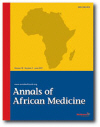
|
Annals of African Medicine
Annals of African Medicine Society
ISSN: 1596-3519
Vol. 6, No. 3, 2007, pp. 109-114
|
 Bioline Code: am07028
Bioline Code: am07028
Full paper language: English
Document type: Research Article
Document available free of charge
|
|
|
Annals of African Medicine, Vol. 6, No. 3, 2007, pp. 109-114
| en |
Community Perspective of Maternal Mortality: Experience from Konduga Local Government Area, Borno State, Nigeria
Kawuwa, M. B.; Mairiga, A. G. & Usman, H. A.
Abstract
Background/objective:High maternal mortality in Nigeria in particular and Sub-Saharan Africa in general has remained one of the key indicators of our poor health care services, infrastructural facilities and negative socio-cultural attitudes to healthy living. The objective is to identify barriers to prompt and effective treatment of obstetric complications leading to maternal mortality in order to develop appropriate strategies to address them at the community level.
Method: The study took place between 10th October and 10th December 2003. An in-depth interview guide developed by the network for the prevention of maternal mortality (NPMM), which contains mainly open ended questions, modified to suit our socio-cultural setting was used.
Results: There was a good understanding among the people of the area that women are dying during pregnancy, labour and puerperium. 28(93.3%) of the respondents recognized some obstetric complications. The main obstacles to accessing the hospital for emergency obstetric care were lack of money and transportation difficulties. Equipping the health facilities, employment of qualified staff, community supported emergency funds for obstetric emergency and the provision of reliable, effective and affordable transport are identified as necessary measures to prevent maternal mortality. The Local Government Areas and community leaders are to champion the cause for the provision of these facilities in their localities.
Conclusion: There is a good understanding of obstetric complications in the community leading to maternal death. The main reasons for delay in seeking care are ignorance, poverty, lack of transportation and distance. Community enlightenment, health education, training of TBAs, poverty reduction and effective, affordable and reliable transportation are means of obviating delays in the decision and transportation leading to maternal mortality. Upgrading and re-equipping of health facilities to provide emergency obstetric care services are mandatory. Community participation in the safe motherhood drive can be ensured using the traditional rulers, religious leaders and the Local Government Authority.
Keywords
Maternal mortality, barriers to care, community perspective
|
| |
| fr |
Kawuwa, M. B.; Mairiga, A. G. & Usman, H. A.
Résumé
Introduction/objectif: Le taux élevé de la mortalité maternelle au Nigéria en particulier et dans l'Afrique du sous Sahara en général demeure toujours un des indicateurs clés de notre services des soins médicaux pauvres aménagement infrastructural et comportement socio-culturel négatif face à une vie saine. L'objet est d'identifier des obstacles aux traitement efficace et rapide des complications obstétriques menant à la mortalité maternelle afin de préparer des stratégies adéquates pour resoudre ces problèmes au niveau communautaire.
Méthodes: L'étude a eu lieu entre 1e 10 octobre au 10 décembre 2003. Un guide d'un entretien en profondeur préparé par la prévention de la mortalité marternelle de reseau (PMMR) se compose principalement des questions libre, modifié d'après notre milieu socio-culturel était utilisé.
Résultats: Il y avait un très bonne entente entre les gens de ce milieu que des femmes sont mort pendant grossesse, accouchement et puerpérium. 28(93,3% des sondés reconnaissent quelques complications obstétriques. L'obstacle le plus majeur pour aller à l'hôpital pour des soins obstétriques d'urgence était pénurie d'argent, et problèmes du transport, des équipements dans l'aménagement de santé, le fait d'embaucher des employés qualifiés, ressources d'urgence pour aider la communauté pour des urgences obstétriques et la prestation du transport fiable, efficace et abordable sont notés comme les grands moyens nécéssaires afin d'éviter la mortalité maternelle. Les zones d'administration départementale et des chefs de la communauté sont responsable pour soutenir la cause de la prestation de ces resources dans leur régions.
Conclusion: C'est sûr et certain qu'il y a des complication obstétriques dans la communauté qui conduissent aux morts marternelles. Des raisons principales qui empèche le fait d'aller bien vite recevoir des soins sont : ignorance, la pauvreté, manque du transport et la distance, éclairecissement communautaire, enseignement sanitaire, formation de TBAs, diminution efficace du niveau de la pauvreté, moyen de transport fiable et abordable sont des moyens menant à une décision tardive menant à la mortalité maternelle. C'est obligatoire d'améliorer les équipements dans les aménagement de la santé pour pouvoir fournir des services des soins d'obstétriques d'urgence. Participation communautaire dans le mouvement de la maternité fiable peut enter en vigeur à travers la participation des chefs et rois traditionnel, chef réligieux et les dirigeants de l'administration départementale.
Mots Clés
Mortalité maternnelle, obstacles aux soins, perspectif communautaire
|
| |
© Copyright 2007 - Annals of African Medicine.
Alternative site location: http://www.annalsafrmed.org
|
|
